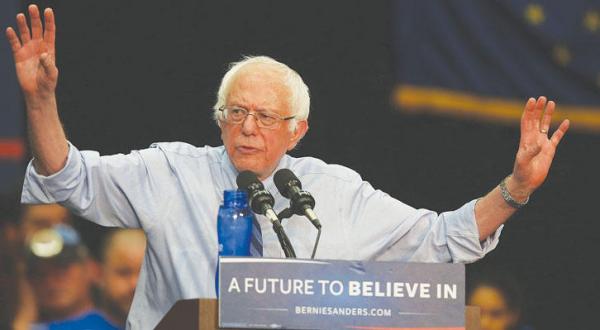Washington- The candidate for the Democratic nomination for President of the United States Bernie Sanders called the super delegates, who can change the results when the party officially appoints the candidate, at a time when the former U.S. Secretary of State’s victory is almost settled.
After Clinton’s victory in the four primaries on Tuesday and ahead of the elections organized by the Democrats and Republicans on Sunday in the southern state of Indiana, the Vermont senator told reporters at the National Press Club in Washington, “It’s virtually impossible for Secretary Clinton to reach the majority of convention delegates by June 14 with pledged delegates alone.
“She will need super delegates to take her over the top at the convention in Philadelphia.”
Sanders held a press conference in Washington, D.C., on Sunday to mark one year since launching his presidential bid, vowing to take his fight for the Democratic nomination to the super delegates currently supporting frontrunner Hillary Clinton.
The Vermont senator conceded that in order for such appeals to make a difference, he would also have to win a majority of the remaining “pledged delegates”, whose votes are fixed according to election results.
Notably, pledged delegates are elected or chosen at the state or local level, with the understanding that they will support a particular candidate at the convention.
Pledged delegates are, however, not actually bound to vote for that candidate, thus the candidates are allowed to periodically review the list of delegates and eliminate any of those they feel would not be supportive. Currently there are 4,051 pledged delegates.
Of the 4,765 total Democratic delegates, 714 are super delegates, which are usually Democratic members of Congress, Governors, former Presidents, and other party leaders and elected officials. They are not required to indicate preference for a candidate.
“The evidence is extremely clear that I would be the stronger candidate to defeat Trump or any other Republican,” Sanders said of the Republican front-runner Donald Trump. He cited several polls showing him doing better than Clinton in a hypothetical head-to-head contest against the real estate magnate.
Still, it would be “an uphill climb” to win the nomination, Sanders said.
For her part, Hillary Clinton replied, telling CNN: “I consider myself as someone who’s on the path, and obviously I’m very far ahead in both the popular vote and the delegate count, so I think the path leads to the nomination,” Clinton said. “But, you know, I’m going to keep competing.”
She also said she expects Sanders to work with her on planning the Democratic National Convention and the platform the party will adopt at it, and was quick to praise him and his supporters.
She said that even after a race that grew increasingly bitter, she expected the two candidates to come together, like Clinton did with President Barack Obama when she lost the primary to him in 2008. She endorsed Obama “immediately” after dropping out in June, she said.
